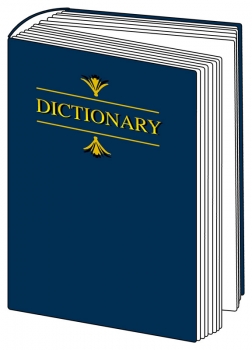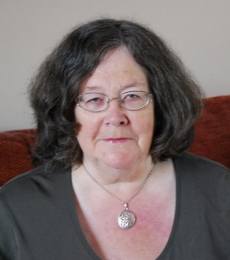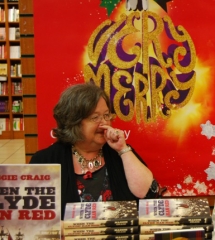Midway between that referendum and the forthcoming council elections, Old Susannah takes a look at the nature, effect and effectiveness of propaganda. By Suzanne Kelly.
Tally Ho! The weather in Aberdeen has been glorious; half of the town seems to have been at the beach or Torrymelinos this past Sunday; even the dolphins showed up to add to a beautiful spring day. I just finished reading Adam Ardrey’s book ‘Finding Merlin’, which I review elsewhere in Aberdeen Voice.
Ardrey makes some interesting observations in this book. Between this and a thread on Facebook where a city employee set out to defend the City’s publication ‘Our Green Times’ which uses (whether deliberately or not) several propaganda techniques, Old Susannah has been thinking about ways in which people are being manipulated by those in power.
Ardrey’s book and other works show that what little we think we know today about Merlin and Arthur had been deliberately garbled by the propaganda arm of the young Christian church. There was a huge power struggle between the existing druidic tradition (where education was prized, men and women were largely equal) and the new Christian movement.
The church needed to seize power and to instil fear and respect in the populace in order to survive and become supreme. The old ways favoured a system of meritocracy for choosing kings; the church used politics and propaganda, and chose to favour hereditary government. The church could not allow any alternative religion or opposition of any kind to exist.
So the druid Merlin was referred to as a madman and a conjurer in Christian-controlled texts of the times, and non-Christians were lumped into one group called ‘pagans’ and ‘heathens’.
The Christian church’s use of propaganda was skilful, and it pretty much ensured druidic tradition was purged from the records. Only in coded form or in ridicule would the church allow its opponents to be referred to at all. The new religion’s propaganda was sometimes brutal, sometimes subtle – but in the end it won.
Thank goodness today people come to positions of power and influence because of their abilities and not because of money and connections. Take Donald Trump for instance (please – just take him), or some of our amazingly-gifted local politicians and ACSEF members.
They don’t rely on connections, money or propaganda; we love them for everything they’ve done to us – sorry, ‘for us’. We can rely on our governments to tell us the truth, the whole truth, and nothing but the truth. Sure we can.
Just look at the fantastic Phase 2 consultation for the tree planting.
No one objected to the scheme! Result! Of course no one knew at the time there would be a deer cull and most of the trees (89,000 plus) would be plunked on Tullos Hill (as the info had been deliberately withheld), but there you go. And surely no one in power would use ridicule to discredit or suppress vocal opponents?
we are constantly being bombarded with subtle propaganda tactics, which can be quite effective
It’s not as if the work of weapons expert Hans Blix was in any way devalued when he said that Iraq did not have secret stashes of ‘Weapons of Mass Destruction’ (this expression, ‘WMD; is itself an example of creating a propaganda phrase which caught on).
Dr. Kelly (RIP), the government advisor, was labelled a ‘Walter Mitty type’ by government mandarins for his courageous stand against the propaganda that led to the Iraq Invasion. Dr Kelly paid for his principles with his life. In fact the whole case for this bloody war was based on a dossier that was ‘sexed up’ – i.e. blatantly amended and turned into propaganda. This was done by the top propagandists of our times: Blair and Campbell.
But we are constantly being bombarded with subtle propaganda tactics, which can be quite effective. Believe it or not, this even happens here in Aberdeen! Perhaps our kindly, benevolent government just wants to help us by digesting facts for us, skipping the ones that might upset us, and painting a rosy picture for us to swallow without question. Quite nice of them, really.
One person, however, wants to analyse the secrets of the propagandist and ruin the party.
See: http://history.howstuffworks.com/historians/propaganda1.htm
Time (finally) to get on with some propaganda-based definitions…
Fear: (noun) state of alarm or terror. In propaganda terms, ‘fear’ is deliberately employed to influence people’s thoughts and actions.
Surely no one would ever employ fear as a propaganda weapon against the good people of Aberdeen? Well, there was the little matter of fear-based propaganda over the gardens: build them or no companies will come to Aberdeen to set up shop was the message that pretty A3 colour flyer and the BIG partnership put about.
Of course BiG is really, really subtle when it comes to propaganda, as we’ve seen recently. While you got this message in a Technicolor brochure, your employer may well have been writing to you to say you should vote for the web. The combined message was: ‘Worried about money? Then you better support the web and we’ll all be rich and have jobs.’
Fear was used on us – and it was used by the secretive group Vote for the City Gardens Project which was accountable to no one – but which certainly put out a nice quantity of propaganda. Old Susannah has copies of the lovely A3 colour leaflet, and is considering whether to frame them or recycle as a cat tray liner. I’ll get back to you on my decision.
Here’s a decision which I have made.
According to my sources, some of those who participated in and/or financed and/or were connected to the secretive ‘Vote for the City Gardens Project’ included:
Stewart Milne (no introduction needed)
Mary Martin (of the Douglas Hotel)
Sandy Clark
Mike Wilson
Colin Manson
Tommy Dreelan
I am sure these modest heroes who helped voters choose sides won’t mind my mentioning them now. However, if any of those named above writes to deny any involvement with VFTCGP, then I will be more than happy to remove their name from my list and issue an apology. If any other VFTCGP supporters or financers who wish to step up to receive the grateful public’s thanks, then please do get in touch. But on with our definitions.
Stop Government Propaganda Now: (noun) American legislation supported by GW Bush (really) which sought to make it a criminal offense for government to influence media to push particular stories, skew the truth, or to hide information.
Has anything like that happened in Aberdeen? Would the local media allow itself to be used? Would local media favour its higher-spending advertisers? Hmmm.
But the city government has its own periodicals including ‘Our Green Times’. The supporter of this periodical who was flying its flag on Facebook quite rightly pointed out that the thing costs time and money to create (taxpayer money mind).
Old Susannah was in an interesting Facebook thread with a city employee who is involved in the publication of Aberdeen City’s PR ‘newspaper’, ‘Our Green Times. Consciously or not, the person who made these posts used several more types of tools straight out of the ‘Propaganda For Dummies’ handbook. The first was:
Name-calling: (noun) Propaganda tool which seeks to both deflect attention away from any actual issues, and create a negative stereotype to brand groups of people with. Name-calling can become widely used (the word ‘CHAV’ being a good example), or it can be something subtle.
The Facebook defender of Aberdeen City’s publication, ‘Our Green Times’ somehow came up with a category of people he called ‘campaigners’, and the implication was made that campaigners were failing to see all the good things going on in the city, and focused on the negative.
Gee. ‘Campaigners’ – the word evokes right-on, aggressive militants with placards, if not extremists. Yet when it comes to issues such as Union Terrace Gardens, the Tullos Hill situation, and the swingeing budget cuts, there is no wider cross-section of ‘campaigners’ to be found. I call them ‘people’ myself. But he’s tried to establish that there is a negative group of people, and they are to be lumped together and called ‘campaigners’ for criticising the city.
Card-stacking: (noun)to present only information which makes a positive public impression – and in so doing gives the impression – whether deliberate or otherwise – that there are no negative issues.
This is in many ways the most serious form of propaganda weapon. In the words of the author of the article published in ‘how stuff works’ in the above link:-
“… the bad stuff is left out entirely. …. this type of propaganda technique presents a lopsided and unrealistic viewpoint that is dangerously deceptive.”
Sorry, but the above description fits exactly with what ‘Our Green Times’ does. In its pages there are no deer culls, no high pollution figures for Wellington Road, and no urban sprawl issues.
By now the Facebook discussion thread was growing by leaps and bounds. Another poster asked our man from ‘Our Green Times’ about several environmental issues. The reply that came back? ‘FFS’. (Old Susannah is told this is a rather rude expression, but I certainly have no idea what it means and no intention of defining it).
Yet another poster showed up to defend ‘Our Green Times;’ she ridiculed the guy who’d asked the questions.
Ridicule: (noun) to belittle by poking fun at something or someone; in propaganda terms, this is an old standby favourite. If you can get your opponent laughed at, then you are on your way.
Old Susannah will put her hand up: I have actually believed one or two people in power in our fair city deserving of a bit of ridicule; some readers may have seen small traces of this in previous columns. Historically, the English literally belittled Napoleon – he was jokingly called a small man. Truth was, he was taller than Nelson.
Old Susannah could go on about other propaganda tools such as ‘transfer’ and ‘Greenwash’ (to pretend to be greener than you are to win acceptance ), but you get the idea.
We were blitzed with propaganda over the City Garden Project, and in the run up to the May elections, we will be bombarded with yet more. I’d just like to suggest strongly to everyone to take on board that these techniques exist, and to be alert for when they are used on you.
By all means apply the same criteria to everything you read in The Aberdeen Voice too.
The Voice will take articles and writing from anyone on any subject, so long as it meets legal requirements for publication. The Voice has no agenda of its own; it has printed items on both sides of issues such as the Menie Golf Course and the AWPR. It has no advertisers to keep happy, only readers to hopefully inform, entertain, and amuse.



